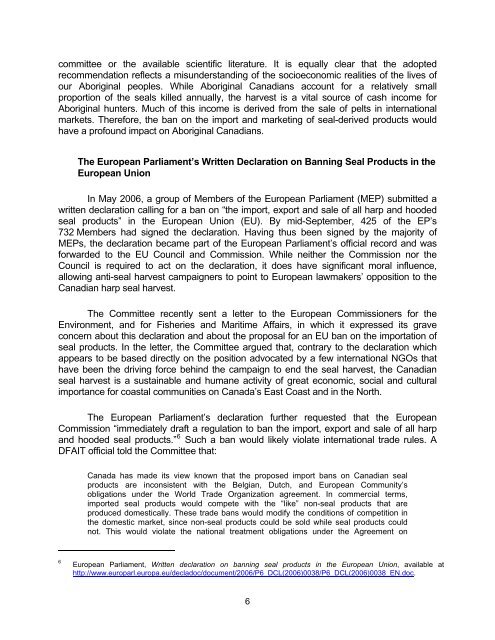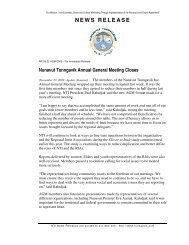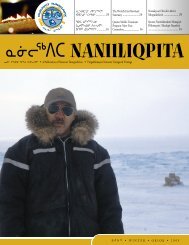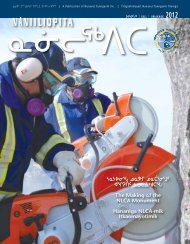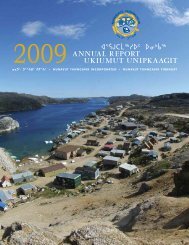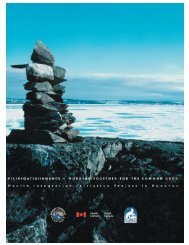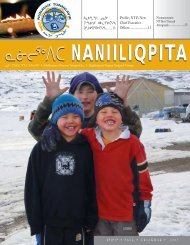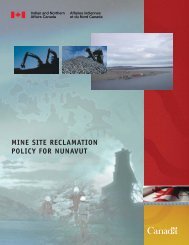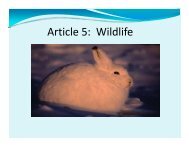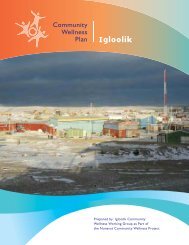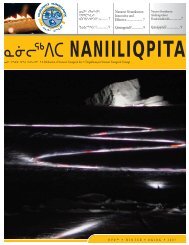Ensuring a Sustainable and Humane Seal Harvest - Nunavut ...
Ensuring a Sustainable and Humane Seal Harvest - Nunavut ...
Ensuring a Sustainable and Humane Seal Harvest - Nunavut ...
You also want an ePaper? Increase the reach of your titles
YUMPU automatically turns print PDFs into web optimized ePapers that Google loves.
committee or the available scientific literature. It is equally clear that the adoptedrecommendation reflects a misunderst<strong>and</strong>ing of the socioeconomic realities of the lives ofour Aboriginal peoples. While Aboriginal Canadians account for a relatively smallproportion of the seals killed annually, the harvest is a vital source of cash income forAboriginal hunters. Much of this income is derived from the sale of pelts in internationalmarkets. Therefore, the ban on the import <strong>and</strong> marketing of seal-derived products wouldhave a profound impact on Aboriginal Canadians.The European Parliament’s Written Declaration on Banning <strong>Seal</strong> Products in theEuropean UnionIn May 2006, a group of Members of the European Parliament (MEP) submitted awritten declaration calling for a ban on “the import, export <strong>and</strong> sale of all harp <strong>and</strong> hoodedseal products” in the European Union (EU). By mid-September, 425 of the EP’s732 Members had signed the declaration. Having thus been signed by the majority ofMEPs, the declaration became part of the European Parliament’s official record <strong>and</strong> wasforwarded to the EU Council <strong>and</strong> Commission. While neither the Commission nor theCouncil is required to act on the declaration, it does have significant moral influence,allowing anti-seal harvest campaigners to point to European lawmakers’ opposition to theCanadian harp seal harvest.The Committee recently sent a letter to the European Commissioners for theEnvironment, <strong>and</strong> for Fisheries <strong>and</strong> Maritime Affairs, in which it expressed its graveconcern about this declaration <strong>and</strong> about the proposal for an EU ban on the importation ofseal products. In the letter, the Committee argued that, contrary to the declaration whichappears to be based directly on the position advocated by a few international NGOs thathave been the driving force behind the campaign to end the seal harvest, the Canadianseal harvest is a sustainable <strong>and</strong> humane activity of great economic, social <strong>and</strong> culturalimportance for coastal communities on Canada’s East Coast <strong>and</strong> in the North.The European Parliament’s declaration further requested that the EuropeanCommission “immediately draft a regulation to ban the import, export <strong>and</strong> sale of all harp<strong>and</strong> hooded seal products.” 6 Such a ban would likely violate international trade rules. ADFAIT official told the Committee that:Canada has made its view known that the proposed import bans on Canadian sealproducts are inconsistent with the Belgian, Dutch, <strong>and</strong> European Community’sobligations under the World Trade Organization agreement. In commercial terms,imported seal products would compete with the “like” non-seal products that areproduced domestically. These trade bans would modify the conditions of competition inthe domestic market, since non-seal products could be sold while seal products couldnot. This would violate the national treatment obligations under the Agreement on6European Parliament, Written declaration on banning seal products in the European Union, available athttp://www.europarl.europa.eu/decladoc/document/2006/P6_DCL(2006)0038/P6_DCL(2006)0038_EN.doc.6


